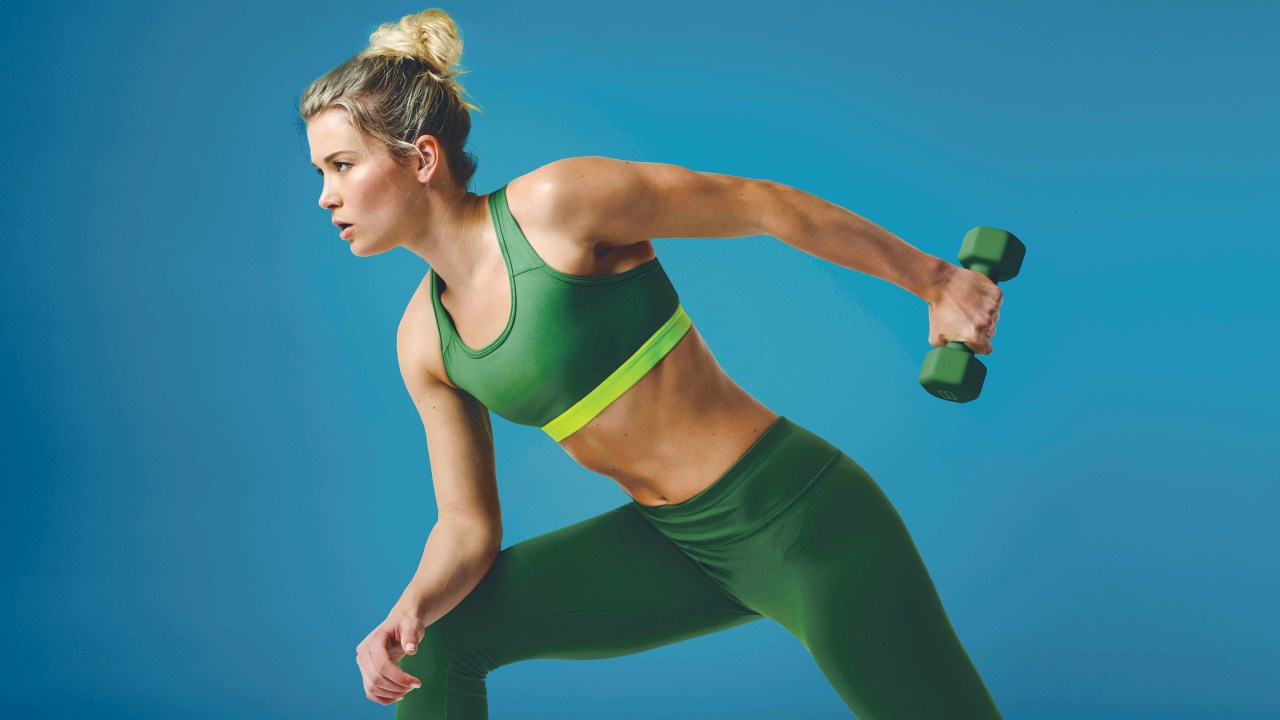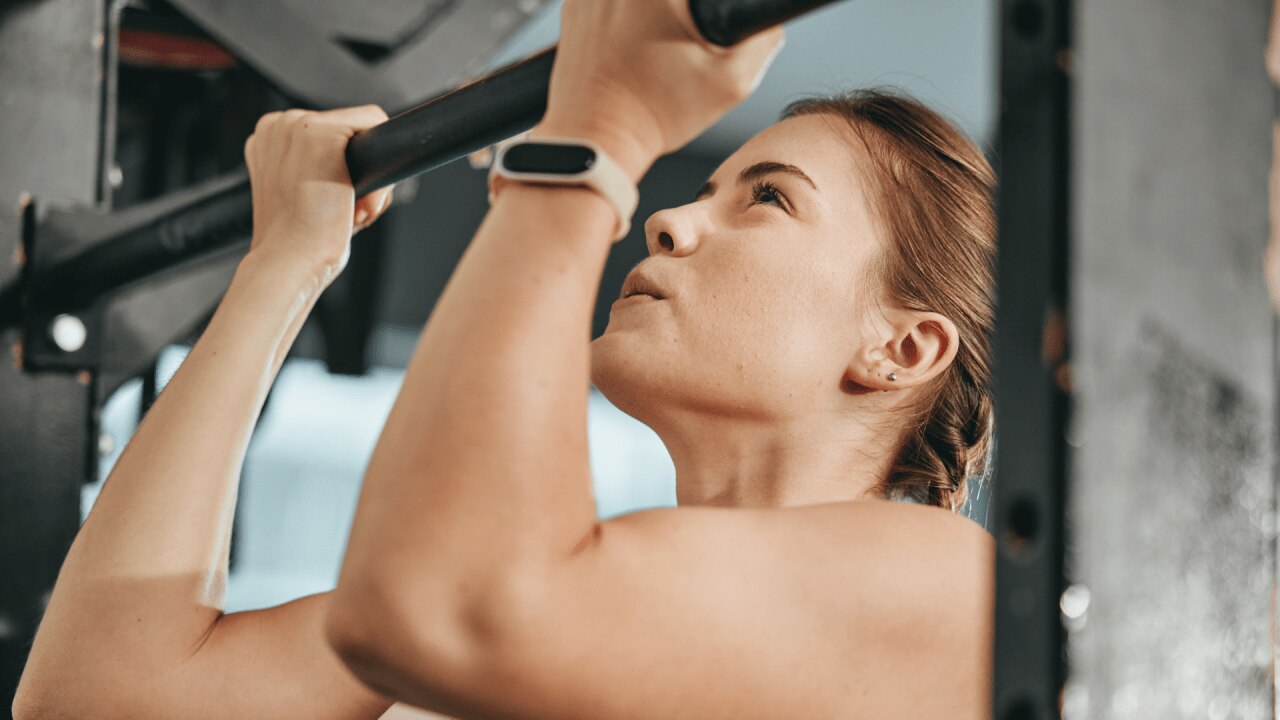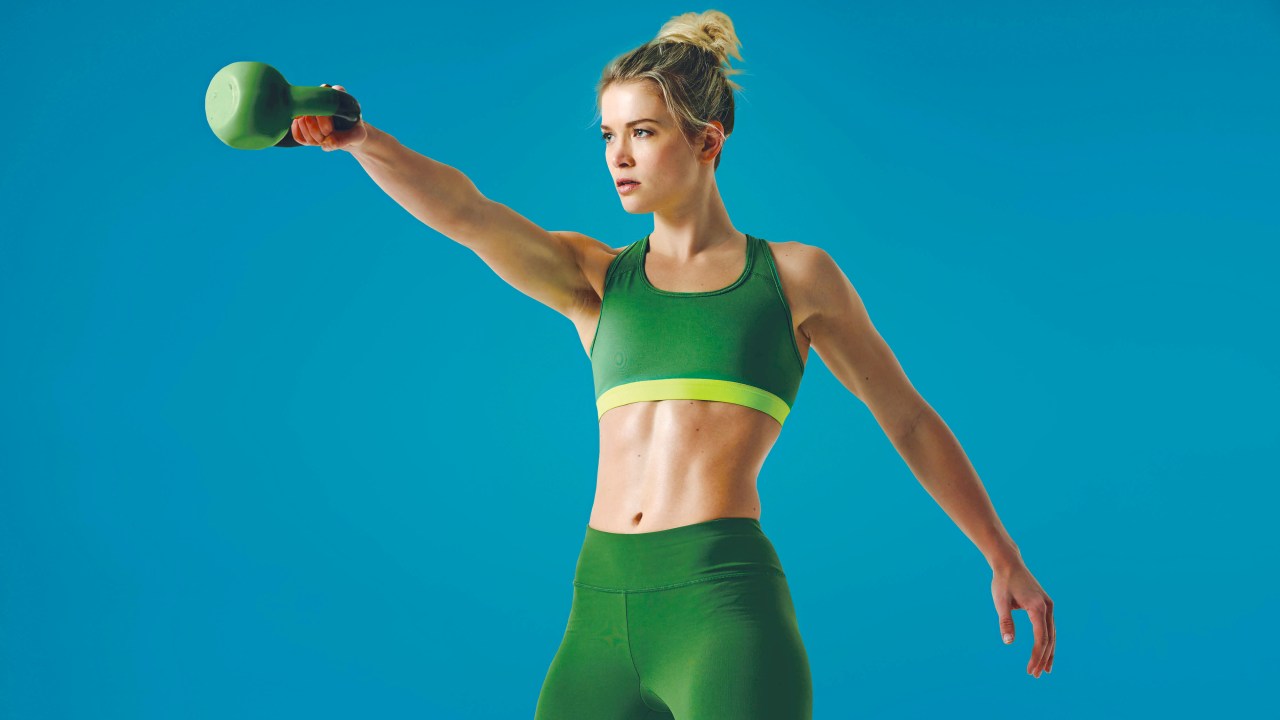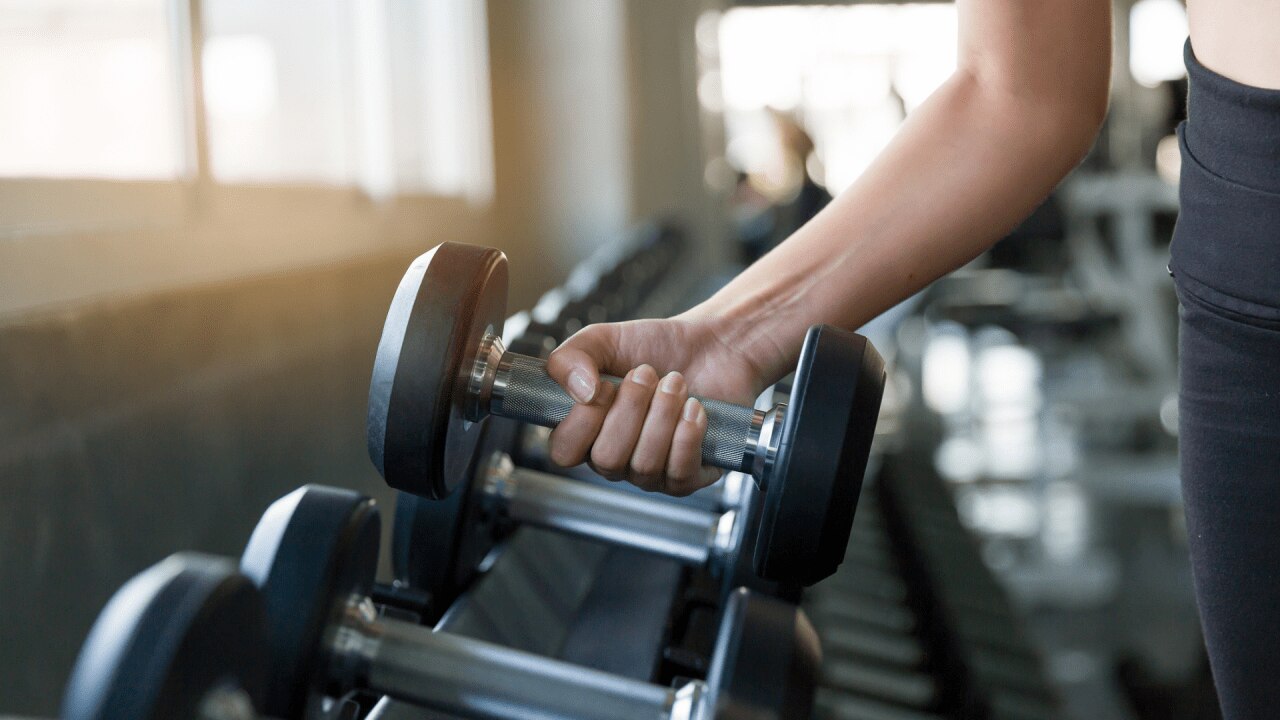The two simple changes that will transform your body
A stronger, fitter and healthier you awaits

Forget dieting and counting calories. According to bestselling author, Dr Gabrielle Lyon, this is the secret to a faster metabolism.
Put away the diet books and throw away the scales. Why? Because body fat percentage has nothing to do with whether you stay slim or live a longer and healthier life. Rather, it’s all about how much lean muscle you have, according to a leading doctor in osteopathic medicine in the US. Dr Gabrielle Lyon has spent years researching longevity and the impact of lifestyle changes in the health of her own patients.
Now, in a new book, Forever Strong, she argues that what we – and, in particular, women – should really be focusing on for optimal health and longevity is not trying to lose weight but getting stronger. “We’re indoctrinated into a body fat-phobic way of thinking about our wellness,” says Lyon. “We focus constantly on what weight we have to lose, when we should switch to thinking about what we are set to gain if we become capable of building stronger muscles through eating more protein and resistance training.”
Rebooting our collective health with an emphasis on building muscle, she says, is the secret to helping wellness-seekers of all ages boost their metabolism, unlock far more energy, stay mentally sharp and shift excess body fat.
Like what you see? Sign up to our bodyandsoul.com.au newsletter for more stories like this.
And to be honest, Lyon – who walks her own talk – is certainly in a position to know. As well as practicing as a doctor both in New York and Texas, she hosts her own Apple podcast with 2.5 million listens, has a YouTube channel with 2.75 million views, and has given a TED Talk on what she terms “muscle-centric medicine”. In her 40s and with two children under five, she bursts with energy, her hair and complexion shining with good health. Her toned physique is an advertisement for her approach, but also a hangover from her days spent as a fitness and strength competitor in her youth.
It was while spending two years at Washington University on a research and medical fellowship in geriatrics and nutritional sciences that she first became intrigued by the rising numbers of people struggling to lose weight, and patients in their 60s and 70s being diagnosed with dementia, despite them following the latest science-backed advice on food and fitness. Over time, she concluded that the connection between these groups and others with ill health was not only that they were ageing or had too much body fat, but that their muscle size and muscle health had plummeted to levels far lower than those of younger people. What was missing from their lifestyles, says Lyon, was resistance exercise and enough protein in their diet – the seemingly magical combination needed to enhance muscle health.
“Protein is critical for health,” she adds. “It plays a vital role not just in building new muscle, but in controlling the functions of other tissues and organs important for metabolic function and quality of life.” Also often overlooked, she stresses, is the importance of protein for “the production of neurotransmitters that keep our brains healthy and have a direct association with sleep and mood.”
Earlier this year, adventurer Bear Grylls, 49, shared how he transformed the health of his whole family by eating more protein: specifically an ‘ancestral diet’, in which red meat features heavily. “For millions of years we’ve thrived and been strongest and healthiest by eating meat, blood and organs,” he said. Lyons says that by consuming more high-quality protein, from animal and some plant sources, and adding in resistance training – starting with something as simple as body-weight exercises and bands three times a week, before progressing to weights – can deliver health benefits within days.

“A lot of people start to feel changes in muscle strength and function, as well as neurological adaptations such as spatial awareness, when they move – even before they notice any visible improvements to their body,” she says. “There will be almost immediate improvements in blood glucose control, and within two weeks their markers for a range of diseases will reduce.”
But that’s not all. Emerging studies have proven that strong muscles are far better at helping the body respond to insulin, resulting in better blood sugar control after meals and a reduced risk of type 2 diabetes and insulin resistance, which affects the health of the heart. In a large trial involving nearly half a million adults published in the British Journal of Sports Medicine last year, a team of US scientists showed that adding more muscle-strengthening workouts not only enhanced fitness but reduced the risk of injuries and improved longevity.
Lyon says the importance of muscle for midlifers comes backed by research, including one study from the University of Copenhagen that shows repeated contractions of skeletal muscle boosts the production of myokines, hormones that influence the way the entire body responds to exercise. “We now know that these myokine hormones are extraordinarily valuable in leveraging the health of the overall body.”
Lyon describes one recent female patient who had struggled with her health and weight for decades, but shed 25kg within nine months of shifting her focus from calorie counting to consuming more dietary protein and lifting weights. “We worked on her protein consumption and her workouts,” says Lyon. “Not only did she lose a lot of weight, but her joint pain disappeared, her biomarkers for autoimmune disease were dramatically reduced, and her levels of blood fats improved.”
It doesn’t end there. From our 50s onwards, she says, good muscle health also helps to maintain bone density and prevent osteoporosis. Best of all, perhaps, it has a powerful anti-ageing effect on the way muscle tissue works above and beyond aesthetics. “By eating dietary protein and doing resistance exercise in midlife, you enable your body’s muscle tissue to act more like the youthful muscle tissue of your 20s,” says Lyon. “It can have life-changing effects on homeostatic mechanisms that influence the brain, ageing, memory and longevity.”

Dr Gabrielle Lyon’s 8 rules to reboot your health
#1. You’re probably not eating enough protein
“Current guidelines suggest you need about 0.8-1g of protein daily per kilogram of body weight, which equates to 50-63g, or two to three palm-sized portions, for an adult weighing 63kg. But these are baseline recommendations set to prevent deficiency and maintain health. I’d argue strongly it’s not enough.
“As we age our ability to digest and utilise protein decreases, meaning we need proportionately more of it in our diets to get the same results. Research from McMaster University in Ontario has shown that intakes of up to 1.6g per kg for an active person are needed to support muscle health from middle age onwards. The minimum I’d ever recommend is 100g of protein daily for men and women who are also doing some resistance training. To give you an idea of what this means, a skinless chicken breast contains 54g of protein, a 145g can of tuna 40g, two eggs 14g, a 250g steak 62g, and beans, peas and lentils anything from 5-8g per 100g.”
#2. It’s not just quantity but the quality of protein that matters
“Protein in food is the delivery system for the 20 amino acids that are needed to support the body’s physical structure. Of these, nine are considered essential amino acids because the body cannot produce them itself and so they must be obtained from food. Animal-derived protein is, by definition, better quality than plant-based protein, in that it contains the highest quantities of these essential amino acids.
“That doesn’t mean you won’t get enough if you eat a vegetarian, vegan or plant-based diet, just that it requires more effort and planning, and you’d have to consume more protein in total to get what you need. You will almost certainly have to supplement your diet with some extra protein sources, such as a vegan protein powder, if you don’t eat at least dairy and eggs.”

#3. Prioritise protein for breakfast
“We come out of an overnight fast after sleeping in a catabolic state, meaning our body is preparing to break down nutrients for energy because our reserves are low. Our skeletal muscle is primed for stimulation first thing in the morning, and by front-loading with 30-50g of good-quality dietary protein in your first meal of the day, you will set off this important process. You begin to impact your body’s intricate machinery, priming it to boost muscle growth and repair, and supporting other important processes.
“Because it fills you up, having protein for breakfast also offsets hunger later on and helps you to make better food choices all day. For breakfast, I have two eggs, sometimes as a frittata, and some Greek yoghurt, which has 10g of protein per 100g serving. And you can add some nuts – there is 6g of protein in a handful of almonds. Sometimes I even have minced beef, which has up to 30g per 100g serving.”
#4. Midlifers need protein after a workout
“Following a resistance workout with a protein shake or snack actually matters less for people in their 20s and 30s than it does for those aged 50-plus. Our ability to use amino acids is reduced from midlife onwards, but taking a 20g dose of protein – the amount of a couple of handfuls of nuts or a shake with 20g of whey protein, for example – when blood flow is increased after the intense muscle contractions of weight training enhances the uptake. Make it a habit if you’re older or if you’re starting this new way of working out with a very low muscle mass.”
#5. Lifting weights three times a week is a non-negotiable
“Increasing your intake of protein will bring benefits to your health, but these are multiplied several fold when you add resistance training to the mix. When you use resistance bands or lift weights during your workout, you immediately help your body’s skeletal muscle to remove carbs from the bloodstream, protecting against conditions such as type 2 diabetes in the longer term. Weights help to ramp up muscle-protein synthesis and build new muscle tissue by using your body’s amino acid reserves for each muscle contraction. “Start resistance training as early in life as you can – I get my kids, aged two and four, doing bodyweight exercises – but by your 40s and 50s, doing it at least three times a week is essential to maximise the breakdown and repair process that keeps muscles strong. It’s also a powerful switch for changing body composition, and you will quickly feel and look leaner and stronger.”

#6. Gradually add more deadlifts and squats
“Progression with strength and resistance training is critical. We have to keep getting better with it or we simply won’t shift that metabolic needle. Don’t ignore aerobic exercise, such as walking and running, which is very important for cardiovascular health, but focus on adding a few more repetitions of squats and deadlifts or lifting a slightly heavier weight every few weeks. You can add resistance work to your daily life in any number of ways – even by doing 30-60 seconds of squats as you stand at your desk. I like to wear a 5kg weighted vest around the house all day.”
#7. East a protein-rich mal hours before bed
“There’s a school of thought – and some research to back it up – that eating 30-40g of quality protein, such as a bowl of Greek yoghurt, before bed can help with overnight muscle protein synthesis as well as increasing metabolic rate. I tend to recommend eating a meal containing 30-50g protein – for example, a chicken breast – three to four hours before you go to bed. Eating anything too late can interfere with sleep and the circadian rhythm, and having protein that bit earlier doesn’t make it any less effective at repairing and building your muscles overnight.”
#8. Consider taking supplements
“The foundation of healthy muscle is a protein-rich diet and resistance exercise. However, there are supplements that can support your quest for better muscle health, and my favourite is urolithin A, a microbiome-derived food metabolite that has been shown in studies to boost muscle health and endurance.
“If you eat little or no red meat, I’d recommend a supplement of creatine, especially from the age of 55 onwards, as it has a phenomenal effect on maintaining muscle mass in conjunction with weight training. Since there are vitamin D receptors in our muscles, everyone should take this important vitamin, and there is emerging research omega 3 fatty acids and fish oil impact muscle health.”
Originally published as The two simple changes that will transform your body




